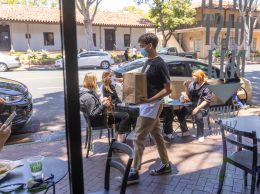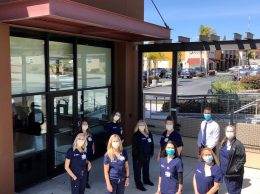By Adam Hill
I recently had the privilege of honoring MindBody at the opening of their campus in San Luis Obispo. As I gazed out at a sea of people — most in commemorative T-shirts identifying them as employees — my throat swelled with excitement.
Why was I overcome in that moment, and why have I spent my entire time in office fixated on economic development? It comes down to jobs. The campus at MindBody will allow the company to grow over 1,000 of them.
Now the cynic in you is thinking, “yeah, yeah, a politician’s buzzword.” And that’s true, as jobs is a word spoken by politicians and candidates as much as words like streamline and transparency and hope.
Why jobs matter to our community like ours should be obvious, but the shift in focus that has occurred over the past half-decade has been to create jobs that either allow people to take care of their family or put them on the pathway to do so. And this is no small matter in a country where whole industries of jobs have been outsourced and where wages have stagnated and job security has all but been eradicated.
Jobs that pay well or afford the opportunities for advancement are an important measure of any community’s well-being. But on an individual level, its metrics matter in ways that defy numbers and stats. This was forever impressed upon me as a child, in the recession of early 1970s, when my father was laid off from his job.
It was a harsh blow to his ego. He was so wounded and bewildered that rather than look for work, he sat and drank and said barely one word to any of us for nearly seven months. Then as he slowly began to engage, with us and with others, he would preface everything by saying, “You know I got fired, didn’t you?”
After months of this, finally, we would, in exasperation, in shame, in frustration, blurt out, ‘Laid off! Not fired! Laid off!’ And he would roll his neck and with a half-smile say: “It feels the same. No job, it feels the same.”
So I learned at an early age how there was much more than some cheap political significance to the word “job.” I learned it contained an essential ingredient of a person’s dignity, and for many of us, the only true path toward civic ease and the luxury of optimism.
My father wallowed and never regained the confidence that a person needs to feel truly connected to their life and to their community.
This experience has stayed with me throughout my own working life, creating my own heightened awareness of the most important status a good job can convey: dignity. The dignity that allows a person to transcend self-involvement, to think beyond your own lot, that allows love and compassion and solidarity and service.
My experience teaching at Cal Poly showed me that when young people feel there is a pathway toward a bright future, when they sense the older generations are doing what they can to allow for and create opportunities for success, there is a stronger sense of purpose and much less interest in engaging with the cynicism and acrimony and self-absorption being sold every day online and on the air.
That’s why I helped create the first county-wide economic development strategy, why I often serve as a go-to person for many of our growing employers, and why I am in the midst of forging a partnership between the county and the SLO Hothouse. I know that the health of our community and how we affirm our common values in local causes is best strengthened by having a better-paid workforce and by encouraging career opportunities in the form of responsible and responsive companies. A truly healthy community doesn’t pit jobs versus the environment or growth for only a few at the expense of others who have to struggle to make it.
That’s why we should all be proud of MindBody and the many growing small companies that have committed to staying here. We need a business and social culture that assigns supreme value to the externalities in the community: why we should not be satisfied with good jobs for a few and poor-paying jobs for many, and why we should welcome and applaud companies with strong social consciences.
• Adam Hill represents the 3rd District on the San Luis Obispo County Board of Supervisors.






 Print
Print Email
Email

















